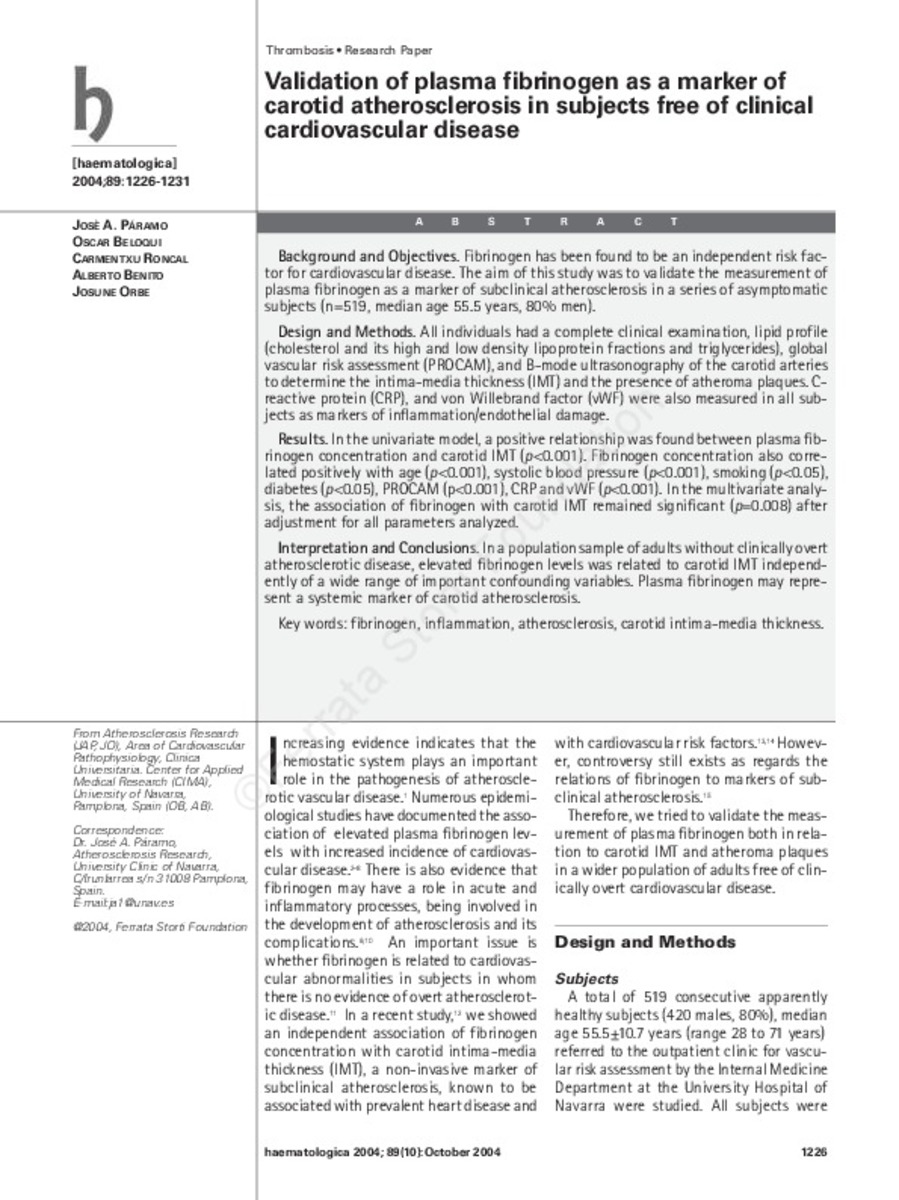Full metadata record
| DC Field | Value | Language |
|---|---|---|
| dc.creator | Paramo, J.A. (José Antonio) | - |
| dc.creator | Beloqui, O. (Óscar) | - |
| dc.creator | Roncal, C. (Carmen) | - |
| dc.creator | Benito-Boilos, A. (Alberto) | - |
| dc.creator | Orbe, J. (Josune) | - |
| dc.date.accessioned | 2012-07-11T16:31:42Z | - |
| dc.date.available | 2012-07-11T16:31:42Z | - |
| dc.date.issued | 2004 | - |
| dc.identifier.citation | Paramo JA, Beloqui O, Roncal C, Benito A, Orbe J. Validation of plasma fibrinogen as a marker of carotid atherosclerosis in subjects free of clinical cardiovascular disease. Haematologica 2004 Oct;89(10):1226-1231. | es_ES |
| dc.identifier.issn | 1592-8721 | - |
| dc.identifier.uri | https://hdl.handle.net/10171/22868 | - |
| dc.description.abstract | BACKGROUND AND OBJECTIVES: Fibrinogen has been found to be an independent risk factor for cardiovascular disease. The aim of this study was to validate the measurement of plasma fibrinogen as a marker of subclinical atherosclerosis in a series of asymptomatic subjects (n=519, median age 55.5 years, 80% men). DESIGN AND METHODS: All individuals had a complete clinical examination, lipid profile (cholesterol and its high and low density lipoprotein fractions and triglycerides), global vascular risk assessment (PROCAM), and B-mode ultrasonography of the carotid arteries to determine the intima-media thickness (IMT) and the presence of atheroma plaques. C-reactive protein (CRP), and von Willebrand factor (vWF) were also measured in all subjects as markers of inflammation/endothelial damage. RESULTS: In the univariate model, a positive relationship was found between plasma fibrinogen concentration and carotid IMT (p<0.001). Fibrinogen concentration also correlated positively with age (p<0.001), systolic blood pressure (p<0.001), smoking (p<0.05), diabetes (p<0.05), PROCAM (p<0.001), CRP and vWF (p<0.001). In the multivariate analysis, the association of fibrinogen with carotid IMT remained significant (p=0.008) after adjustment for all parameters analyzed. INTERPRETATION AND CONCLUSIONS: In a population sample of adults without clinically overt atherosclerotic disease, elevated fibrinogen levels was related to carotid IMT independently of a wide range of important confounding variables. Plasma fibrinogen may represent a systemic marker of carotid atherosclerosis. | es_ES |
| dc.language.iso | eng | es_ES |
| dc.publisher | Ferrata Storti Foundation | es_ES |
| dc.rights | info:eu-repo/semantics/openAccess | es_ES |
| dc.subject | Fibrinogen | es_ES |
| dc.subject | Inflammation | es_ES |
| dc.subject | Atherosclerosis | es_ES |
| dc.subject | Carotid intima-media thickness | es_ES |
| dc.title | Validation of plasma fibrinogen as a marker of carotid atherosclerosis in subjects free of clinical cardiovascular disease | es_ES |
| dc.type | info:eu-repo/semantics/article | es_ES |
| dc.relation.publisherversion | http://www.haematologica.org/content/89/10/1226 | es_ES |
| dc.type.driver | info:eu-repo/semantics/article | es_ES |
Files in This Item:
Statistics and impact
Items in Dadun are protected by copyright, with all rights reserved, unless otherwise indicated.






